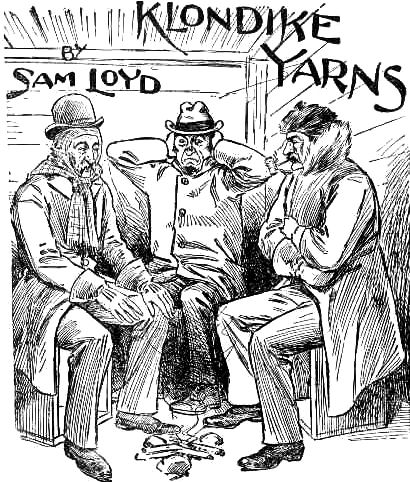



AS SHOWING HOW A puzzle may be extracted from anything, I am going to ask our young puzzlists to pass judgment upon the relative merits of three prize yarns which were spun in the Klondike.
It was during my last trip to the gold fields, when, in the company of some adventurous spirits, who, like myself, were in search of health, wealth and happiness under adverse circumstances, that we found ourselves huddled together in the main drawing-room of our domicile, patiently awaiting certain climatic changes which would soften up the ground so as to permit of its being scratched with a pick. We were all semi-professional men, which fact, I suppose, injected a certain spirit of rivalry into every discussion that was started. No matter how marvelous a story was told, it at once became the duty of the others to narrate a tale which, for daring improbability, should eclipse it. Veracity never was questioned; everything went, and the palm was yielded gracefully to the one who told the biggest “whopper” which had the slightest semblance of probability.
I remember that the question of intelligence, or rather precociousness, in very young children had been under discussion, when one of the party remarked: “I never was so taken aback nor struck by the reasoning powers of a child as one day at dinner, when we were partaking of what we called soused pigs’ feet. Harry, who was but three years old, had already eaten four pigs’ knuckles, and was clamoring for more, when his mother said: ’ I don’t think you had better cat any more, Harry, or you will see the bogie man to-night. '
" ‘Now, mamma,’ replied Larry. After a moment of silent thought, ‘I may just as well settle the truth of that bogie story in my mind now and once for all; give me some more pigs’ feet. ’ So. From a purely investigating standpoint, he ate twice as many as he had before.”
“‘Yes,’ said another member of the party, who was a civil engineer, some children have precocious reasoning powers, for I remember when Fanny was less than two years old, we took her to Niagara, and she made a calculation which proved how much water runs over the Falls in a month to an exact quart. ”
There was silence for a few moments. And it looked as if the engineer would retain the championship. But the doctor, who had a very slow and deliberate manner of speech, which added greatly to the impressiveness of what he might be telling, remarked: “Those arc indeed remarkable stories, which go to prove the inheritance of mental power; but I recall a curious case which happened to me in Switzerland, which I have never been able to explain satisfactorily to myself. I was staying for the night at a little inn at Altdorp, when the host, who had probably heard of my reputation as a specialist, told me that one of his neighbors had a child which they feared was deaf and dumb. The parents had made all those little tests, such as clapping hands, etc., to attract the baby’s notice, such as all mothers do, but without avail, and to relieve their minds the host asked me to examine the child's ears. I did so very thoroughly, and pronounced the case to be a hopeless one, wherein the child would grow up to be deaf and dumb.
“The parents, who were Swiss, did not speak a word England, but asked through the host, who acted as interpreter, if something could not be done for the child.
“‘Absolutely nothing, ’ I replied; ‘the case is hopeless.’
“To my utter astonishment the child, which was not yet six months old, looked up in my face with a sweet, infantile smile, and murmured: ‘Absolutely nothing? ’
“It sounds incredible, I know, especially as the parents and every one else but my host only spoke German; nevertheless, it is an actual fact.”
Sometimes, after each of us had spun his yarn, there was a discussion as to which had told the best, and at times the competition was so close that it took considerable argument and some little force to settle the dispute. In a competition of the kind just mentioned it would be an easy matter to adjudicate, nevertheless, just as a lesson in logic, we will ask our young puzzlists to pick out the most remarkable of the three yarns, giving reasons for the preference.
Everybody, including their cousins. uncles and aunts, caught on to the spirit of one or more of those Klondike yarns, and gave reasons for selecting one of the most remarkable of the three. As was surmised, however, while many discovered one of the catches, very few hit upon two, so, according to the theory of chances, the probability of any one person catching on to all three of the points was so remote that there were only a few left to the final sifting.
The winners all selected the first story as being remarkably beyond all belief. Just imagine that three-year-old infant eating forty-eight pigs' feet in the cause of science! He had already devoured “'four pigs' feet” (not “four pig's feet”), and then tackled twice as many more (32 more) just to satisfy his mind regarding the truth or fallacy of the existence of a “bogie man.”
There was really nothing in the other stories which gives evidence of extraordinary intelligence or which should excite our surprise. A stupid child which had been told that there were exactly two pints to a quart said that the water which ran over the Falls of Niagara in a month was also exactly two pints to a quart. Nothing, of course, could he more natural that that a deaf and dumb babe should say absolutely nothing, so the first yarn was the only remarkable “whopper” which would bring a blush to the check of Baron Munchausen.
[Page 42]